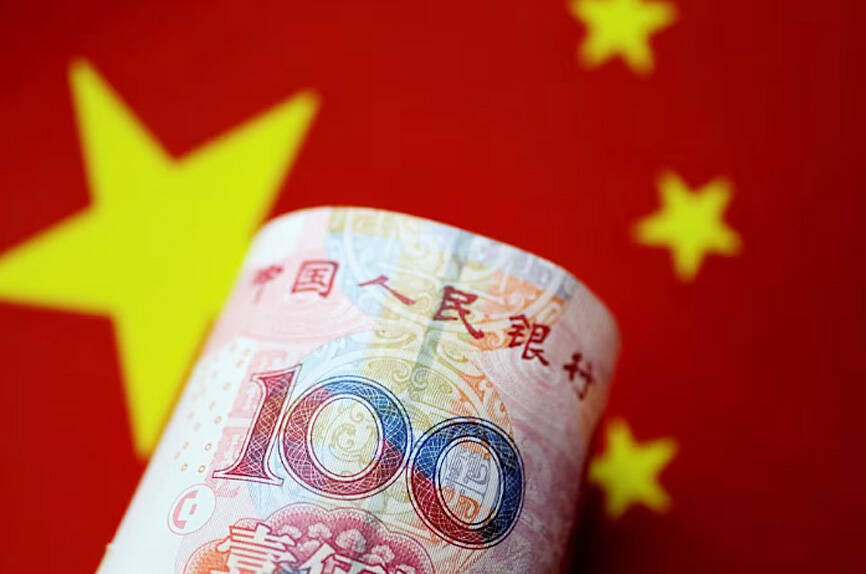The Ministry of Justice Investigation Bureau (MJIB) is tracking the movement of money from foreign sources to prevent Chinese funds from being used to interfere in the presidential and legislative elections on Jan. 13, sources said yesterday.
The bureau’s Anti-Money Laundering Division is monitoring channels through which foreign money flows into Taiwan, such as underground remittance services, sources familiar with the matter said.
The effort is targeting offshore funding used to increase the click-through rate of online influencers, and support specific candidates and temple charity events, the sources said.

Photo: Reuters
Some online opinion leaders who have gained notoriety by commenting on political issues publish content that attacks Taiwan, or is pro-Beijing, unverified or controversial to gain assistance and donations from Chinese supporters, they said, adding that the actions support China’s “cognitive warfare” tactics.
The bureau is closely monitoring controversial online personalities or the marketing companies behind them to determine if they receive money from suspicious sources, they said.
When suspicious funding is detected, the agencies trace the money and provide cash transaction reports and suspicious transaction reports to help prosecutors investigate such cases, they said.
Chinese election-interference strategies also include buying advertisements through third parties in Taiwan, such as supporters’ associations and foundations, or using temple charity events as a pretense for vote-buying, they said.
Funding for such efforts might be transferred through underground remittance or money laundering schemes using cryptocurrencies, the sources said.
The bureau is working with local prosecutors to share information regarding such cases, they said.
Lo Cheng-chung (羅承宗), a professor and director of Southern Taiwan University of Science and Technology’s Institute of Financial and Economic Law, yesterday said that authorities should target “upstream” funding sources to prevent foreign actors from spreading disinformation through online influencers.
Regulations that have been put in place to prevent foreign actors from interfering in the nation’s radio, television and publishing industries cannot effectively regulate behavior on social media, Lo said.
A large amount of false information is spread online, preventing the public from receiving accurate and complete information, which poses a serious threat to democracy, he said.
France has passed legislation to fight online misinformation, while Germany has passed the Network Enforcement Act to combat false news online and the EU passed the Digital Services Act to protect the rights of digital users, which demonstrates the necessity for legislation to prevent disinformation, he said.
The Securities Investment Trust and Consulting Act (證券投資信託及顧問法) has been amended to regulate online influencers creating content related to investments and holding online platforms accountable for fraud that harms investors, Lo said.
To combat disinformation, Taiwan should follow the example of the EU to require platform operators to be transparent and disclose where their funding comes from, which would reveal which influencers are “paid to talk,” he said.

INVESTIGATION: The case is the latest instance of a DPP figure being implicated in an espionage network accused of allegedly leaking information to Chinese intelligence Democratic Progressive Party (DPP) member Ho Jen-chieh (何仁傑) was detained and held incommunicado yesterday on suspicion of spying for China during his tenure as assistant to then-minister of foreign affairs Joseph Wu (吳釗燮). The Taipei District Prosecutors’ Office said Ho was implicated during its investigation into alleged spying activities by former Presidential Office consultant Wu Shang-yu (吳尚雨). Prosecutors said there is reason to believe Ho breached the National Security Act (國家安全法) by leaking classified Ministry of Foreign Affairs information to Chinese intelligence. Following interrogation, prosecutors petitioned the Taipei District Court to detain Ho, citing concerns over potential collusion or tampering of evidence. The

NEGOTIATIONS: Taiwan has good relations with Washington and the outlook for the negotiations looks promising, Minister of Economic Affairs J.W. Kuo said Taiwan’s GDP growth this year is expected to decrease by 0.43 to 1.61 percentage points due to the effects of US tariffs, National Development Council (NDC) Minister Paul Liu (劉鏡清) said at a meeting of the legislature’s Economics Committee in Taipei yesterday, citing a preliminary estimate by a private research institution. Taiwan’s economy would be significantly affected by the 32 percent “reciprocal” tariffs slapped by the US, which took effect yesterday, Liu said, adding that GDP growth could fall below 3 percent and potentially even dip below 2 percent to 1.53 percent this year. The council has commissioned another institution

NEGOTIATIONS: The US response to the countermeasures and plans Taiwan presented has been positive, including boosting procurement and investment, the president said Taiwan is included in the first group for trade negotiations with the US, President William Lai (賴清德) said yesterday, as he seeks to shield Taiwanese exporters from a 32 percent tariff. In Washington, US Trade Representative Jamieson Greer said in an interview on Fox News on Thursday that he would speak to his Taiwanese and Israeli counterparts yesterday about tariffs after holding a long discussion with the Vietnamese earlier. US President Donald Trump on Wednesday postponed punishing levies on multiple trade partners, including Taiwan, for three months after trillions of US dollars were wiped off global markets. He has maintained a 10 percent

TRADE: The premier pledged safeguards on ‘Made in Taiwan’ labeling, anti-dumping measures and stricter export controls to strengthen its position in trade talks Products labeled “made in Taiwan” must be genuinely made in Taiwan, Premier Cho Jung-tai (卓榮泰) said yesterday, vowing to enforce strict safeguards against “origin laundering” and initiate anti-dumping investigations to prevent China dumping its products in Taiwan. Cho made the remarks in a discussion session with representatives from industries in Kaohsiung. In response to the US government’s recent announcement of “reciprocal” tariffs on its trading partners, President William Lai (賴清德) and Cho last week began a series of consultations with industry leaders nationwide to gather feedback and address concerns. Taiwanese and US officials held a videoconference on Friday evening to discuss the